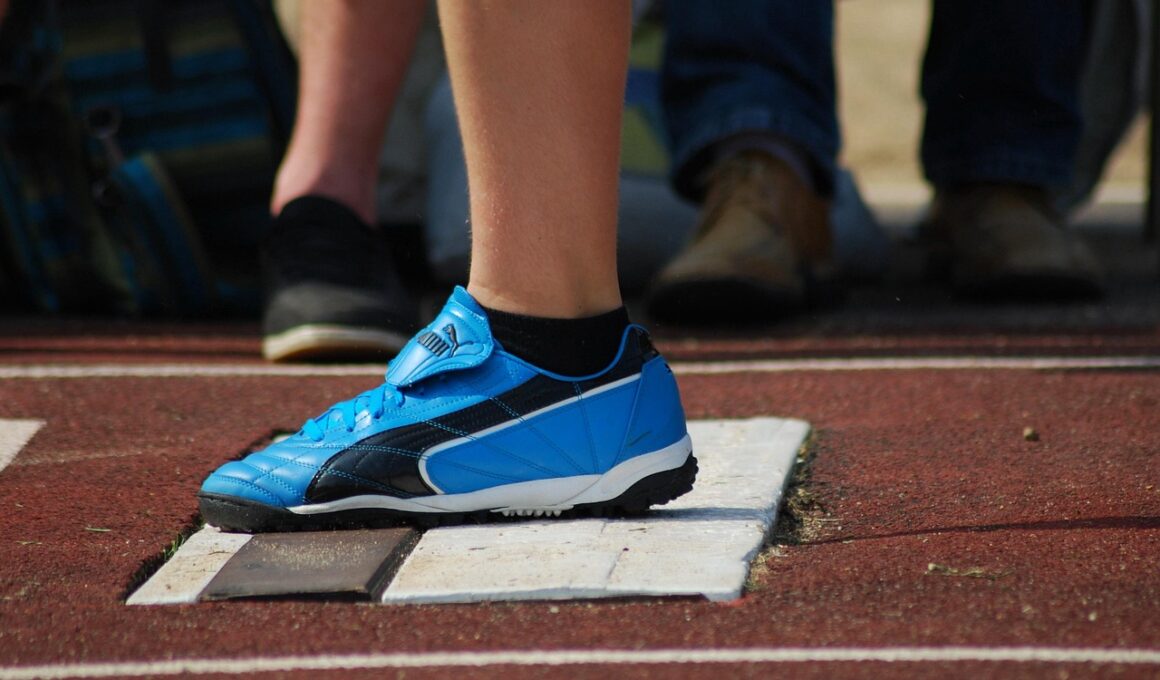Young Stars: Rising Talents in Youth Track and Field
The world of youth athletics is brimming with remarkable young talents who redefine the limits of sports, particularly in track and field. These exceptional athletes are not just participating; they are breaking records and inspiring their peers. Events such as the 100 meters, long jump, and discus throw witness jaw-dropping performances from young stars, showcasing their dedication and skill. Athletics programs across the nation are nurturing these potentials, providing them with training programs and access to expert coaches. As these athletes shine bright, they embody the spirit of collaboration, striving for excellence while supporting one another. Community investments in youth athletics focus on talent development and personal growth, equipping youths with the tools needed for success in sports, and life stages. Initiatives are tailored to encourage participation among underrepresented groups, ensuring a diverse atmosphere. Many organizations provide scholarships aimed at supporting their educational pursuits alongside their athletics careers. By motivating young athletes, we witness the emergence of their records which becomes milestones for future generations. Celebrating achievements of these athletes sets the stage for tomorrow’s Olympic champions. The journey beyond school athletics begins with their current victories.
Achievements and Records
When we speak of records in youth track and field, we refer to exceptional performances that epitomize hard work, resilience, and unwavering commitment. Athletes worldwide are constantly chasing new personal bests, and records showcase staggering performances. Events span various distances and disciplines, including hurdles, relays, and multi-event competitions. These achievements, often celebrated during national and regional meets, reveal which young athletes are destined for greatness. Schools and clubs track these milestones closely, with many publicly displaying notable records, encouraging competition among peers. Monthly and yearly aggregates of outstanding performances help level the playing field, ensuring every athlete has recognition. Coaches and mentors play pivotal roles in supporting athletes breaking these records. They understand the importance of mental preparation, physical conditioning, and the role of nutrition in achieving peak performance. Encouraging athletes to believe in themselves builds confidence and motivation to push boundaries further. Inspirational stories emerge from these records, serving as beacons of hope. It’s common to hear of young individuals who overcame obstacles to achieve greatness in athletics, spreading messages that anything is possible with determination. As seasons progress, fresh records continually enthrall fans and inspire young competitors to strive even harder.
The Role of Coaches
Coaches are integral to the success of youth athletes in track and field. They provide essential guidance, ensuring athletes develop their skills effectively. Not only do coaches inspire athletic performance, but they also foster life skills crucial for their athletes’ future. Coaches tailor training regimens suited for individual athletes, finding the balance between intensity and recovery. They observe, analyze, and make strategic adjustments, which helps optimize performance and potential. Establishing a supportive relationship between coaches and athletes fosters a nurturing environment, allowing vulnerabilities to be addressed. Coaches teach valuable lessons about teamwork and sportsmanship, encouraging supportive group dynamics to thrive. The commitment that coaches show to their teams encourages young athletes to mirror that dedication. Achieving personal bests often becomes a shared goal, and collective successes further unite teams. A successful youth coach adapts to the unique needs of each athlete while creating an inclusive atmosphere. The mentorship provided by coaches often extends beyond the athletic field, as they contribute to the personal development of young athletes. Building character through sports leads to well-rounded individuals ready to tackle life’s challenges. Coaching remains a cornerstone in cultivating future champions, demonstrating lasting impacts.
The role of community in youth athletics cannot be underestimated, as they provide the foundation for budding athletes to develop their skills. Local clubs and organizations are pivotal in organizing events, training camps, and workshops tailored for young talents. Many athletes flourish in supportive environments where their families and peers cheer them on during competitions. Community sponsorships often play a significant role in providing resources needed for training sessions, track facilities, and equipment. These collaborations foster an environment where young athletes feel valued and recognized for their efforts. Educational workshops focusing on health, nutrition, and wellness are often introduced within these communities to ensure a holistic approach to athletic development. When communities rally behind their youth athletes, it cultivates an ecosystem that prioritizes personal growth and achievements. Local and regional competitions encourage participants to aim for excellence not just for personal gain, but for the pride of their community. The sense of belonging fuels their drive, pushing them toward success. Long-lasting relationships formed through youth athletics often transcend sports, building networks of support that endure through life transitions. The community’s impact on these athletes becomes a common thread in their inspiring journeys.
Future Prospects
The future of youth athletics looks promising with new talent emerging each year. Young stars in track and field serve as a glimpse into the next generation of champion athletes. As they continue to shatter records, many of these competitors express aspirations of competing on national and international levels. Programs designed to identify and nurture young talent are becoming increasingly prevalent, ensuring those gifted in athletics receive proper training and exposure. Coaches emphasize developing not just physical abilities, but mental toughness too, which is essential for navigating competitive sports’ pressures. Youth championships regularly attract scouts and sponsors, leading to scholarships and training opportunities that further elevate these young athletes’ prospects. Networking opportunities arise through competitions, as talent meets mentorship, guiding them toward future successes. Many of today’s young athletes envision Olympic participation as their driving motivation. The stories of athletes such as Usain Bolt and Allyson Felix resonate with these rising stars, inspiring them to dream bigger. Parents often play supportive roles, encouraging their children to pursue their passion, realizing that success is a journey, rather than a destination. Collectively, these elements drive the evolution of youth athletics, preparing rising stars for a bright future.
In conclusion, recognizing and celebrating achievements in youth track and field creates an uplifting atmosphere that empowers young athletes. We witness their growth as they break records, set personal bests, and compete fiercely among peers. The community support combined with dedicated coaching adds valuable resources needed for the development of skilled athletes. Each young star brings fresh energy and determination, amplifying the spirit of competition. Encouraging diversity and inclusivity within athletics ensures even more representation, enabling wider participation. Various organizations advocate for underprivileged athletes, empowering them to chase their dreams despite financial constraints. Achievements within youth athletics serve as motivating factors for aspiring athletes, pushing them to reach their goals. It sets the standard for future generations and showcases the benefits of community involvement in shaping young athletes. Stories of perseverance and dedication emerge from this domain, resonating within the broader context of life’s experiences. To foster success in youth athletics, we must continue nurturing the environment where young athletes can shine. Their records may just mark the beginning of their journey toward greatness. With continued support, these young stars will leave an indelible mark on the realm of athletics.
Celebrating young athletes often includes recognizing their journeys and the obstacles they overcome. Within youth athletics, we see tremendous potential, coupled with the challenges of competition and personal growth. Physical challenges, hormonal changes, and a balance between academics and sports complicate the experiences of these young talents. Celebrating their efforts and encouraging them through recognition seldom goes unnoticed. Schools and local organizations implement awards ceremonies to honor these athletes, reinforcing their accomplishments and resilience. Friends and families often come together to celebrate individual achievements, building morale and support systems essential for athletes to thrive. Social media platforms play a significant role in recognizing accomplishments and sharing journeys publicly. Athletes gain motivations from online communities cheering them on, bolstering their confidence. The emotional validation they find in these platforms reinforces their dedication to pursuing their dreams. As sports become increasingly popular, young athletes often find inspiration from renowned professionals, establishing critical role models in their lives. These figures serve as shining examples of what can be achieved with hard work, leading the youth to believe in their capabilities. Encouraging and celebrating young athletes continues to change the landscape of track and field, shaping the champions of tomorrow.
As we look to the future of youth athletics, tracking the evolution of performance standards plays a vital role in cultivating talent. Observing how youth records improve over the years showcases advancements not only in individual athletes but also in coaching techniques and sports science. Collectively, performance analytics have gained traction, aiding coaches in identifying optimal training regimens. These advancements in technology allow records to be broken previously thought unattainable. As athletes develop physical capabilities, the overall mental approach to optimally performing has changed. Reviewing past performances enables current athletes to learn from their predecessors while pushing past limitations. Incorporating feedback from past champions shows athletes how dedication translates into results. Youth competitions often serve as platforms for testing new ideas and training methods, with success benchmarks raising continually. The evolution of performance in youth athletics is redefining the expectations parents, athletes, and coaches have moving forward. The grace and speed exhibited by the current generation usher in a new standard, creating a buzz of excitement among spectators eager to see their approaches unfold. There’s optimism that the future of youth athletics is bright, fostering untap potential that inspires many.





